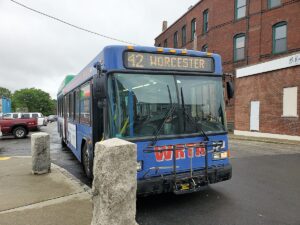
A Worcester Regional Transit Authority bus lays over in this file photo. Photo by Pi.1415926535 | CC BY-SA 4.0
Regional transit authority officials reported record ridership numbers on Tuesday and cheered the newly fare-free bus rides people are taking around the state — something Transportation Secretary Monica Tibbits-Nutt said would help push people out of their cars.
Ridership among RTAs, which serve nearly every municipality outside the MBTA’s coverage area, shot up to 2.345 million in June 2024, surpassing the pre-Covid level of 2.131 million rides in June 2019.
RTA riders flocked back to the buses following a dramatic pandemic dip that saw ridership drop to 875,000 in fiscal 2020, according to a presentation given by Michael Lambert of the Brockton Area Transit Authority.
Members of the Regional Transit Authority Council highlighted how their local systems have expanded their route maps and timetables in 2024 thanks to boosted funding, which also enabled systems to eliminate fares.
Bruno Fisher of the Montachusett RTA, which operates in communities around Leominster, Gardner, and Athol, said his system added Sunday service to several routes and is starting to roll out more “microtransit” options.
Tibbits-Nutt told the administrators gathered at the Transportation Building that expanded RTA service unlocks possibilities for workers and students to be able to commute without owning a car.
“I think as we go into 2025, we know a lot of people are suffering with traffic. Many of them are stuck in congestions. … But as we are giving you more funding, and as hopefully we continue to be able to give more funding, that helps us close those gaps. It helps us get cars off the road. And really that, at this point, we have to start just shifting people out of their cars. Even if it’s one or two days a week,” the secretary said at the RTA Council meeting.
The Healey administration in October highlighted $30 million in grants to fund fare-free service at 13 of the state’s 15 regional systems, from $293,054 for the Cape Ann Transit Authority to more than $9.5 million for the Pioneer Valley Transit Authority.
Lambert, of the Brockton RTA, said eliminating fares and expanding service contributed to Brockton’s record numbers in 2025. The City of Champions saw 340,459 riders in September, compared to a previous recent high of 268,730 for the month of September from 2014.
“This is great news to see across the state,” Lambert said, adding that he wanted to “counteract the negativity” he hears about the high-earner income surtax that is funding transportation investments.
The “millionaire’s tax has made a huge difference to the RTAs,” Lambert said, and his system tries “not to rely too heavily on fares given fluctuations in ridership.”
For Nantucket, Gary Roberts of the NRTA said increased bus ridership has meaningfully cut back on traffic.
“Parking is the hardest thing and just causes people to drive around in circles for hours trying to find a single place to park,” Roberts said.
Because there are no parking lots at the ferry terminal on the island, Roberts said a circle of cars dropping off or picking up passengers can lead to a “nightmare” of traffic. Now, the NRTA offers buses from outlying parking lots down to the boats.
And the fare-free options, introduced on Nantucket in April, have made a difference for service industry workers and other year-round island residents.
From April through October, NRTA has seen a 70 percent increase in ridership over fiscal 2023. Six months into the new fiscal year, as of Monday the system had already surpassed the prior year’s ridership numbers, and Roberts said off-season ridership is up 65 percent.
“I think our workers, the service workers on the island, benefit the most,” he told the council. He added, “It’s been one of the biggest game-changers for the island.”
Tibbits-Nutt said she wants to see RTAs get the same attention as the Boston-area MBTA.
“We really need to talk about this in the same way we are talking about the MBTA, because I often say, the MBTA serves 177 communities, the majority of the other 174 are served by the RTAs. And it’s whether you’re talking about our gateway cities, whether you’re talking about our rural communities, your services really are the lifeline,” she said.






